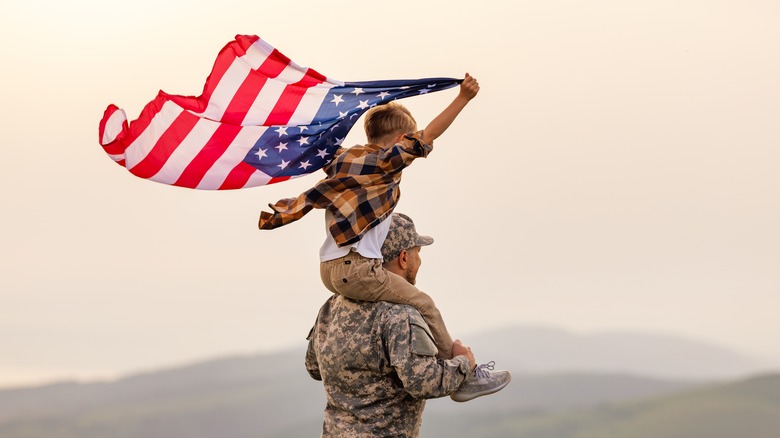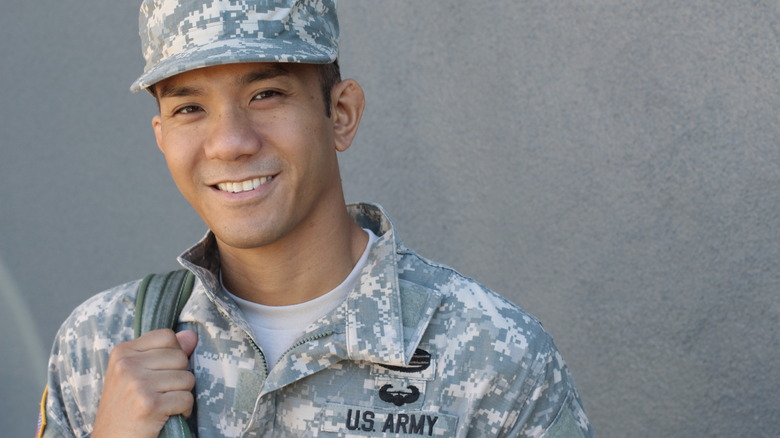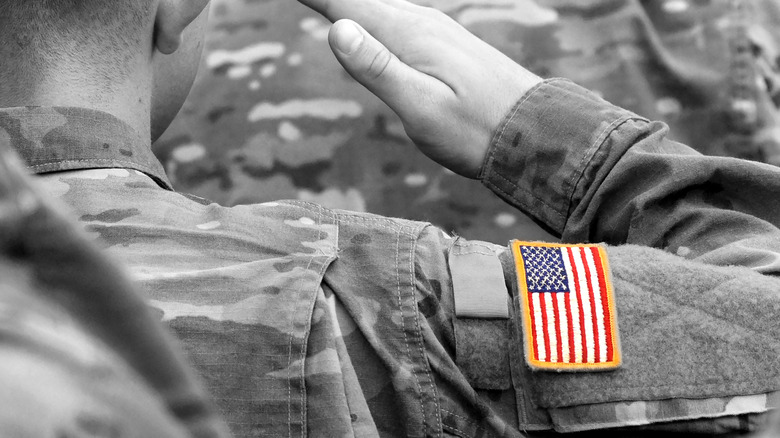What Is The Returning Soldier Effect?
Soldiers returning home from war are generally seen as cause for joy and celebration, although that hasn't always been the case (things were a bit hit-and-miss during the Vietnam War). Look no further than the preponderance of "soldiers returning home" videos on social media, and you can see that emotions run high when loved ones return home from deployment. When soldiers are reunited with their partners, they are, of course, going to do, shall we say, "certain activities" with their spouses that they were unable to do while deployed, and oftentimes that leads to new babies a certain number of months later.
Interestingly, a century or so ago, researchers noticed a phenomenon, according to the National Library of Medicine. Not only are an unusually high number of babies born several months after large numbers of soldiers return home from war, but a majority of them are boys, whereas pure chance would suggest that an equal number of boys and girls would be born. The phenomenon even has a name: "The Returning Soldier Effect," and it occurs at the complex interplay of warfare, genetics, and human sexuality. And the reasons for it might have something to do with the height of the soldiers who survive to return home.
The Unexpected Preponderance Of Baby Boys
In statistics, when there is a choice between two outcomes, and there are no other variables to consider, then the odds are the same for either outcome: 50/50. So statistically speaking, you may be compelled to believe that the number of boys born worldwide and the number of girls born worldwide, putting aside any variables, would be exactly the same (or so close to one another as to be statistically insignificant). However, that is not the case. As Our World In Data reports, on average, worldwide about 105 boys are born to every 100 girls. That's not a huge difference, but it is certainly not statistically insignificant, either.
However, as Psychology Today notes, scientists have known "for some time" that wives of soldiers returning home from war who become pregnant shortly after their men get home produce more boys than girls. Actual numbers are difficult to come by, but as the academic paper, "Big and tall soldiers are more likely to survive battle: a possible explanation for the 'returning soldier effect' on the secondary sex ratio," via the National Library of Medicine, notes, it's "widely known" that returning soldiers produce more boys, and that it's been known since at least World War I.
Okay, But Why?
You will remember from junior high sex-ed that it's the father's sperm that carries the chromosome that will determine whether a baby is a boy or a girl, as Clear Blue reports. So when soldiers return home from war and set about reproducing, why do they seem to be disproportionately filled with the Y chromosome? Researcher Satoshi Kanazawa came up with a hypothesis, as detailed in the academic paper, "Big and tall soldiers are more likely to survive battle: a possible explanation for the 'returning soldier effect' on the secondary sex ratio," via the National Library of Medicine. If you took the time to read that lengthy title, you would have seen the factor that caused Kanazawa to test his hypothesis. Which is to say, supposedly bigger and taller soldiers are more likely to survive a war, and bigger and taller men are more likely to favor the Y chromosome.
That hypothesis is born out (no pun intended) in the birth records of Britain following World War I, according to Psychology Today, which is to say that bigger and taller soldiers survived, and there were more baby boys than baby girls born to those British soldiers following the war. We'll spare you the math, but following WWI, Britain had "millions" of extra boys following the Great War.
Is This Still A Thing?
You may have noticed, after reading the preceding paragraphs, that the results of the "returning soldier effect" were most pronounced following World War I, and that a hypothesis about the reason for the effect was evaluated based on records following that war. However, World War I was a century ago, and warfare has changed significantly since then, as has our knowledge about health, the economic and social factors that compel people to sign up for military service, and so on. So there are three questions to consider about this theory on the reason for the returning soldier effect: First, do bigger and taller soldiers still survive war more than their smaller peers? Second, do returning soldiers still produce more boys? And third, if they do, is it still because their fathers are more likely to survive the war?
The answer to the first question is an unqualified yes. Warfare may have changed, but it still favors the taller and the bigger, for complicated reasons that won't be rehashed here (they're explained better in this Psychology Today article). As for the question of more boys, the answer appears to be no. According to this paper, via the National Library of Medicine, researcher William H. Hames posited that, after the Iran-Iraq War, male births actually fell, possibly because of mothers, due to stress, "disproportionately" aborted male fetuses. Of course, both warfare and human reproduction are things that are ongoing, and it will take more wars and more research to truly note whether or not this phenomenon is still a thing.



